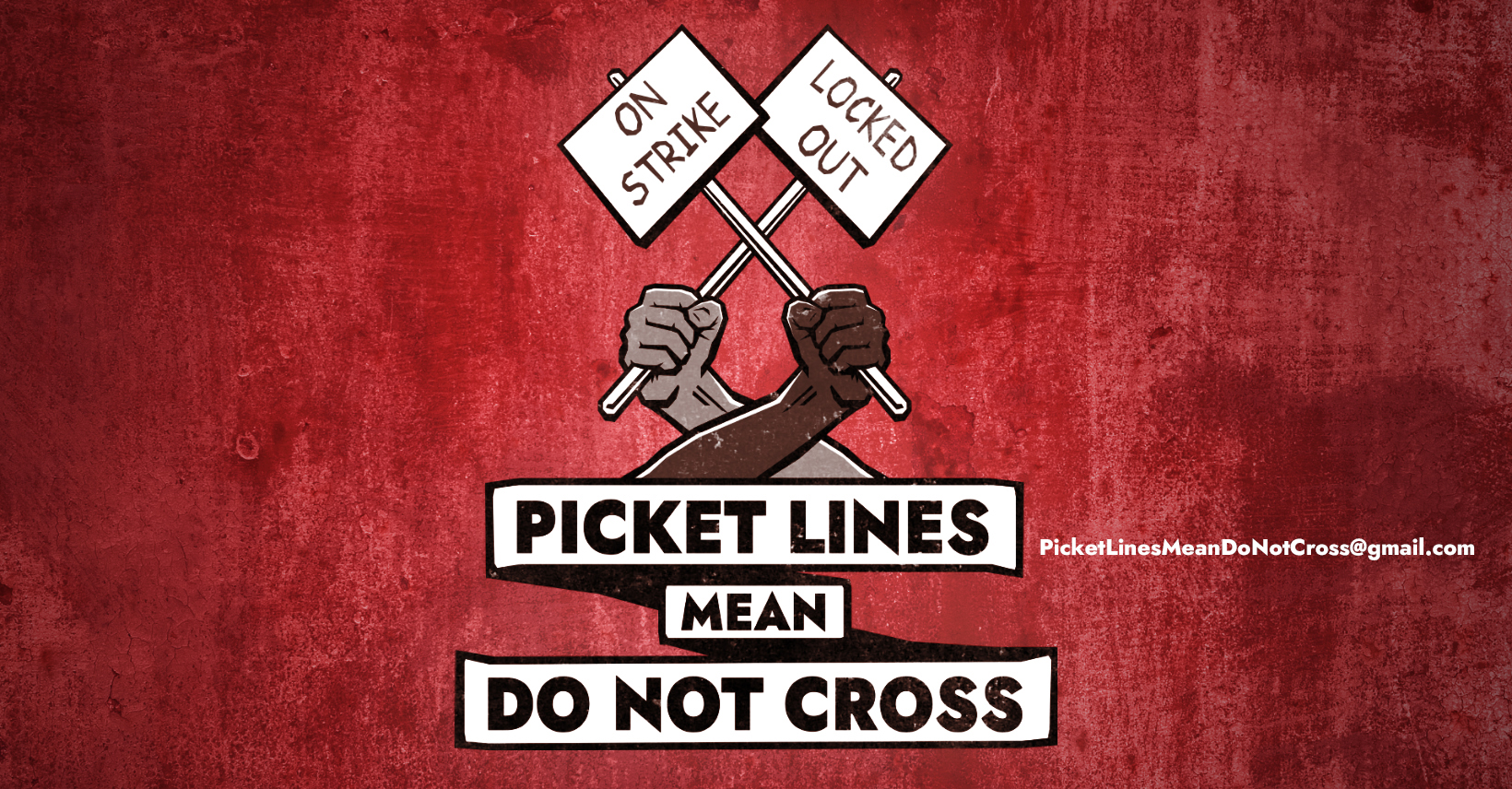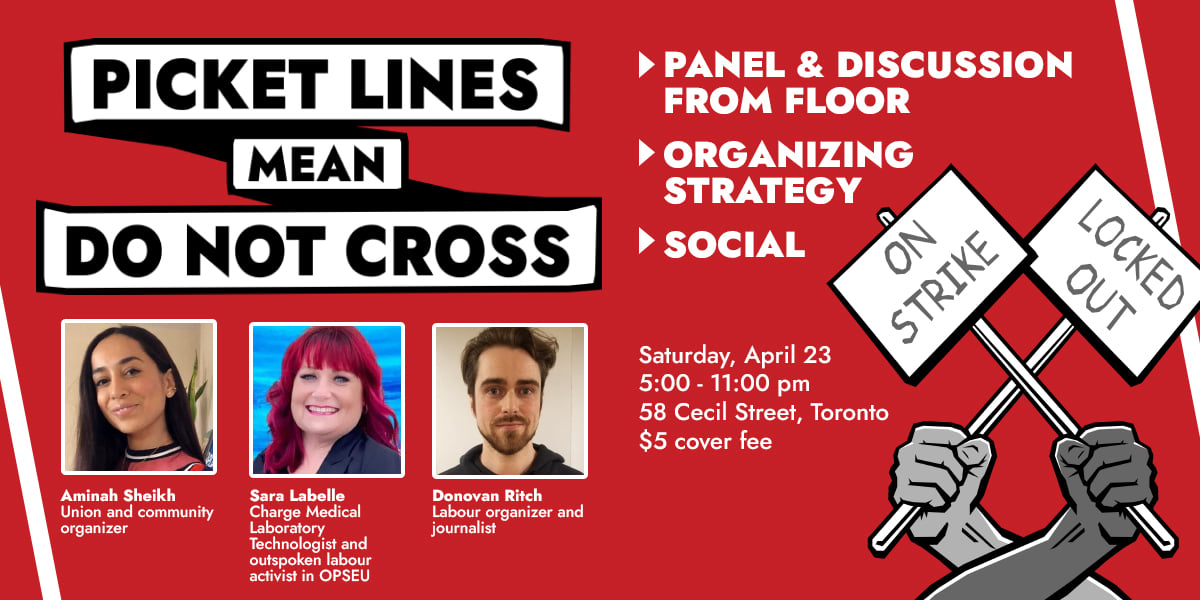
Fightback is very honoured to be part of launching a new campaign saying that it is never ok to cross a picket line. United with other labour activists and trade unions, this campaign attempts to educate the general public on the need to respect picket lines. With inflation, government attacks on workers and profiteering lockouts, we can expect picket lines to be a more frequent occurrence. It has never been more important than now to rebuild the tradition of strong pickets that are essential for workers to win.
Capitalism is in crisis. Prior to the pandemic, a massive slump was in preparation. The inherent contradictions within the system were building up into a classical crisis of overproduction. But then COVID-19 blew that inherent crisis out of all proportion. How did the bosses respond? They used the pandemic and the slump to their advantage to squeeze more profits from workers. Scandalously, while frontline workers were literally risking their lives keeping essential production going, many bosses turned to lockouts to force down wages, gut pensions and benefits, and erode union rights.
To get out of the pandemic-induced downturn governments turned to massive debt and money printing. This would have been half understandable if they had spent this money to support workers, create jobs, and build public infrastructure. But despite the right wing hue and cry over CERB, over 90 per cent of the debt and quantitative easing were doled out as corporate welfare to the capitalists. This government largesse resulted in corporate profits ballooning 46 per cent in 2021, to almost $1.4-trillion, while wages were stagnant.
These handouts and quantitative easing have had two effects. Firstly, as any high school economics student can understand, printing money leads to inflation. Prices are now going up at a rate of over five per cent, making everyone five per cent poorer every year. Over a three year contract this adds up to more than a 15 per cent wage erosion. Unsurprisingly, workers are not happy about this hidden austerity when they buy groceries, pay rent, and fill their tank. The bosses tell us that our labour is a commodity just like any other. So be it! If commodities are going up in price by five to six per cent, then so must the price of the commodity that workers sell—our ability to work. This is especially the case when corporations have been massively profiteering. But the bosses don’t want to pay us the true value of our work, which can only be won by struggle. Therefore inflation inevitably leads to more picket lines, as it did in the 1970s.
The other effect of debt-fueled corporate welfare is the desire of governments to balance their books off the backs of workers. The debt is entirely due to the crisis of the capitalist system, and bailouts to the bosses, but this is conveniently forgotten by the corporate press who blame public sector workers. Austerity is on the order of the day as nurses, teachers, cleaners, postal workers, and bus drivers are all forced to endure wage restraint and layoffs. This also cuts the services the rest of the working class relies on. So yet again, the capitalist crisis forces more picket lines as public sector workers resist austerity.
Whether it is lockouts and profiteering, inflation and wage erosion, or the battle against austerity, every road leads to the picket line. Workers and unions who aren’t willing to fight will see everything gained in the previous period taken away. In this time of crisis, workers will be forced to struggle just to keep their heads above water, let alone make any real gains. That is why it is vital that when workers do struggle, their pickets are strong and respected.
Unfortunately, over recent decades the tradition of respecting picket lines has been lost by many sectors of the population. Many people don’t understand that nobody goes on strike without it being deadly serious. A strike is the last option for workers, and it means that this struggle is essential for workers to live. Anybody crossing a line or scabbing is literally taking food out of the mouths of the workers on the line, and their families.
Even worse, the vital need for unions to respect each other’s lines has also been eroded. If a union won’t respect the line of another group of workers, then why should anybody respect their line when they go on strike? Respecting a picket line has got to be the ABC of union solidarity, without which the labour movement would not exist today.
One element that makes picket solidarity more challenging is the increasing use of injunctions and “back-to-work” legislation to make effective pickets and strikes illegal. But we cannot overcome this problem by ignoring it. In the 19th century all unions and all strikes were illegal. Joining a union could get you imprisoned for entering into “a conspiracy to raise wages”! But when everybody defied these unjust laws they became impossible to enforce. The rights we enjoy today were won in struggles such as the 1919 Winnipeg general strike, the 1937 GM Oshawa strike, the 1945 Ford Windsor strike, and the militant strikes of the 50s and 60s in Quebec. Out of these movements workers won the right to organize, bargain, form legally recognized and viable unions, and the right to withdraw our labour.
If we are not prepared to take the same actions that our forebears were willing to take to gain union rights, all of those rights will be taken away, along with the wages and conditions gained via using these rights.
In the final analysis this comes down to the right to picket, and have those pickets respected by other workers. People need to know that that scabbing is an unacceptable social taboo. We need a mass education campaign to win support for picketers. If everybody commits to respect picket lines then the law will be forced to align itself with social reality, as it did in the post-war period. We support change in legislation, but we have studied history and understand that the greatest gains in legislation result from the real class struggle in the workplace. Unions need to adopt the best practices to support workers respecting pickets. We need to make hard pickets and anti-scab policies the standard expectation in the labour movement.
Above all, we must link the struggle for strong pickets and working class solidarity with the fight against capitalism as a whole. If capitalism was a system of generalized prosperity then nobody would ever need to organize a picket line. But this is not the reality of capitalism today. The wealth of the rich is built off the blood, sweat, and tears of working class people. If capitalism did not push us down we would not be forced to fight back. So we also fight to build a new socialist society where workers will no longer have to fight to survive. And the solidarity and organization we learn from the struggle to respect picket lines are the tools we need to build a socialist society.
We call on everybody to join the PICKET LINES MEAN DO NOT CROSS campaign, take the pledge never to cross a picket line, build flying squads to support workers on strike and locked out, and win our unions to a no crossing policy. Strike to win, and change the world!
Below is the official callout of the campaign:
PICKET LINES MEAN DO NOT CROSS!
More and more workers have been forced onto the picket lines to defend their standard of living.
Management has locked out workers from coast to coast, demanding workers accept cuts in pay, benefits and pensions. Increasing inflation is also forcing workers to take strike action to keep up with the rising cost of living. Contract after contract, the bosses refuse to raise wages above inflation despite making billions in profits. This has forced workers to choose between living in poverty or standing up and fighting back.
But when workers find themselves on a picket line, they discover that the importance of their struggle is not well understood and respected. Often the public, and even sometimes workers, cross the pickets without understanding the terrible repercussions of this action. This lengthens strikes and leads to a race to the bottom where all working class people are worse off.
Right wing governments, the corporate media, and the courts also do everything in their power to weaken and vilify locked out and striking workers. Corporations have even resorted to flying in scabs by helicopter to weaken the lines. Without the fundamental right to strike and picket we would have no labour movement today, and therefore it is essential we fight back against the weakening of picket lines.
To help workers win against these attacks we are launching a mass education campaign to say it is never ok to cross a picket line. Nobody takes the decision to walk a line without it being a serious undertaking. We need to educate fellow workers and the general public that everyone benefits from working class solidarity.
In addition to organizing a mass education campaign, we are also encouraging individuals, organizations, and unions to take a pledge to never cross a picket line without the explicit permission of the workers on that line. We are also encouraging organizations and unions to adopt a “no crossing” policy, that generalizes the best practices from the labour movement to build solidarity and win victory.
It is time to bring an end to weak and ineffective picket lines. Too many struggles have been lost by workers across this country. This is a campaign to say loud and clear: PICKET LINES MEAN DO NOT CROSS!
HOW TO GET INVOLVED:
- Attend our launch event on April 23rd, 5:00pm to 11:00pm EST. In-person at 58 Cecil Street, Toronto, ON M5T1N6. Join us for a panel of labour activists discussing the campaign, bring your questions and comments for the discussion, and stay for a social!
- Join our Facebook group for news, lively discussions and updates! https://www.facebook.com/groups/1132045027620027
- Help us Spread the Campaign! Contact us at PicketLinesMeanDoNotCross@gmail.com to learn about how you can bring the campaign to your union local or organization. We are more than happy to provide guest speakers, resources and advice at your organization’s meeting or to a group of workers outside of them!
- Make a Personal Pledge to never cross a picket line! Petition out soon.


